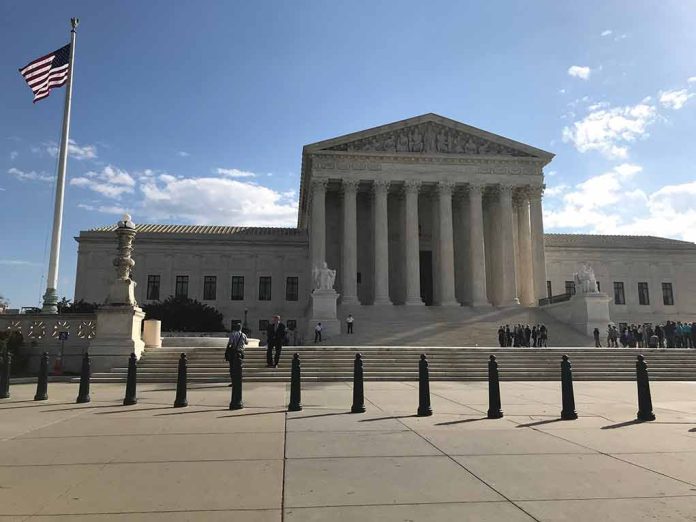
Justice Samuel Alito quashes retirement rumors, affirming his commitment to the Supreme Court amid political pressure.
At a Glance
- Justice Alito, 74, explicitly rejects retirement rumors, emphasizing his dedication to constitutional duty
- Alito’s stance preserves the Supreme Court’s 6-3 conservative majority
- Recent controversies highlight Alito’s independent judicial position
- Alito’s decision impacts potential landmark constitutional cases
Alito Stands Firm Amid Retirement Speculation
Supreme Court Justice Samuel Alito has decisively put to rest swirling rumors about his potential retirement. The 74-year-old jurist, appointed by President George W. Bush in 2006, has made it clear that he has no intention of stepping down from his position on the nation’s highest court. This announcement comes amid increasing pressure from various political circles and speculation about the future composition of the Supreme Court.
Republicans are already talking about Justice Alito potentially stepping down as soon as the end of the current Supreme Court term, which concludes in June.
— Lawrence Hurley (@lawrencehurley) November 8, 2024
Alito’s firm stance on remaining in his role underscores his commitment to serving based on constitutional duty rather than political considerations. As the second-oldest justice on the bench, Alito’s decision to continue his tenure maintains the current 6-3 conservative majority on the Supreme Court, a crucial factor in upcoming landmark cases that could shape American jurisprudence for years to come.
*JUSTICE SAMUEL ALITO PLANS TO REMAIN ON SUPREME COURT: WSJ
— zerohedge (@zerohedge) November 12, 2024
Recent Controversies and Judicial Independence
Justice Alito’s resolve comes in the wake of several controversies that have thrust him into the spotlight. He has faced criticism for his position on various issues, including calls for his recusal from cases related to the 2020 election and the January 6 riots. Alito has staunchly defended his position, rejecting these demands and maintaining his judicial independence.
Any “reasonable person who is not motivated by political or ideological considerations or a desire to affect the outcome of Supreme Court cases would conclude that the events recounted above do not meet the applicable standard for recusal.” – Samuel Alito
Additionally, Alito has been on the losing side of recent Supreme Court rulings, including a case involving social media content moderation and First Amendment rights. These decisions have highlighted Alito’s role as a crucial conservative voice on the court, even when in the minority.
Strategic Implications for the Supreme Court
Alito’s decision to remain on the bench has significant implications for the future of the Supreme Court. With the current 6-3 conservative majority intact, the court is poised to continue its trajectory on key constitutional issues. This stability in court composition comes at a time when public approval of the Supreme Court has been relatively low, adding weight to the importance of each justice’s tenure.
The speculation surrounding Alito’s potential retirement was fueled by broader political considerations. Some Republican leaders had reportedly hoped that Alito, along with Justice Clarence Thomas (76), might consider retiring during a Republican administration. Such a scenario could have allowed for the appointment of younger, conservative justices, potentially cementing a conservative majority for decades to come.
Republicans are keeping a close eye on Justices Alito and Thomas for potential retirements in Trump's second term. https://t.co/EBJR2EFSQi
— NBC4 Washington (@nbcwashington) November 8, 2024
Historical Context and Future Outlook
Alito’s commitment to his role on the Supreme Court aligns with the tradition of justices serving based on their sense of duty rather than political timing. This decision maintains the current dynamics of the court, which have been shaped by recent appointments, including three justices appointed during former President Trump’s tenure.
Looking ahead, the stability of the current Supreme Court composition suggests that major shifts in judicial philosophy are unlikely in the near term. However, the ongoing debate about Supreme Court justices’ tenure and retirement timing continues to be a topic of national interest, highlighting the delicate balance between judicial independence and the political realities of Supreme Court appointments.
Sources:
- Samuel Alito Thinking About Retirement: Report
- Should Alito and Thomas Be Pushed to Retire? Conservatives Are Divided.
- Justice Alito plans to remain on Supreme Court, resisting pressure to step aside: report






